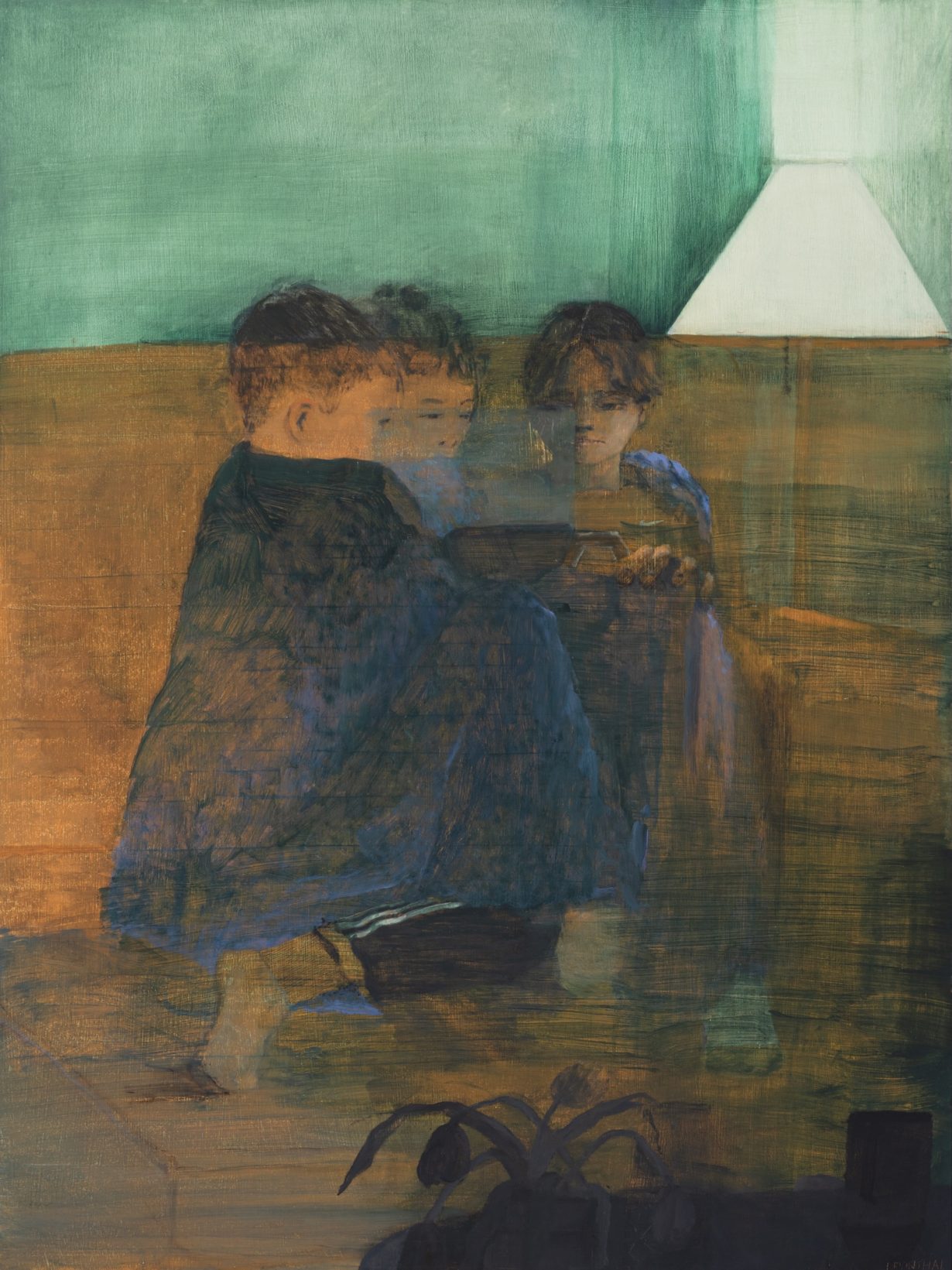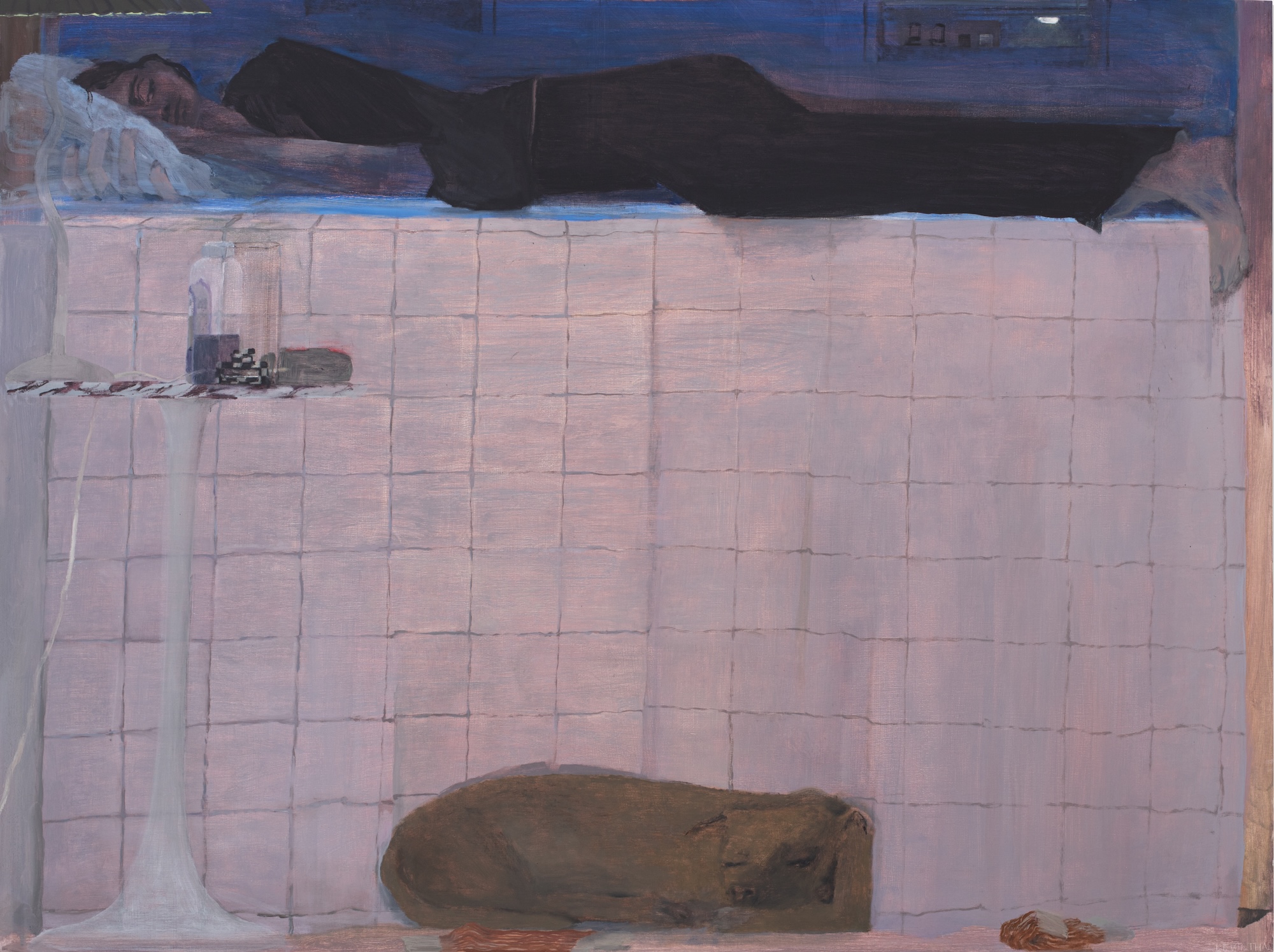The artist’s wonky, playful paintings hide within them a layer of existential ambivalence
A key motif of Mirror Matter, Philadelphia-based painter Aubrey Levinthal’s largest UK exhibition to date, is the humble Tupperware. In one portrait a tub of plain penne is held by a woman slouching in a chair before an unfinished canvas, her large eyes lost in thought. The last strand of spaghetti curls limply in its transparent container at the edge of the still-life Studio desk (2025). Levinthal’s hazy, diaristic paintings document the objects, relationships and routines that populate the unexceptional day-to-day life of a working artist. Lunch breaks, school runs, housework and daytrips are cast in a cool, melancholic palette as people with enlarged eyes and hands, including one figure with dark hair in a messy bun who might stand in for the artist, stare blankly ahead. Swathes of pale, dusty pinks and greyish greens set the dominant tone, while saturated bursts of colour, like the bright red jumper in Sink Stomach (2025), punctuate the subdued atmosphere.
Working primarily on panel, Levinthal’s textures are dry and scratchy, with successive layers of oils thinned with solvents and scraped away with blades. Her wonky, multipoint perspectives give some of the paintings the playful angularity of a pop-up book, with objects painted face-on to the plane of the canvas, while surfaces like desks, tables, bedspreads and nightstands are stretched and flattened until they almost fill the frame. Figures can also be awkwardly foreshortened or placed at odds with their surroundings. The two women portrayed in side-profile in Laps around the square (2024) are imposed upon an aerial view of the drab winter park they stroll around. In the background, a person pushing a pram and another walking a dog are inexplicably seen from above.

Just as the Tupperware container reappears in various compositions, emptied and refilled as the days pass by, everyday objects recur across these interrelated works. A pair of red striped socks sported by the artist in Lunch break (2025) returns in Worry Woman (2025) strewn on the floor as the same figure lies half-asleep on top of the covers of a squared bedspread that fills most of the canvas. Cables and chargers are a continual presence, twisting through table legs and snaking out of frame. Levinthal is particularly drawn to transparent materials: glasses, bottles and plastic sandwich bags are almost imperceptibly differentiated from the murky surfaces they sit on. Other objects are wilfully ambiguous: the empty sink in Sink Stomach registers initially as a desktop computer, drawing links between domestic and administrative labour. Daubs of purple paint suggesting winter flowers double as crumpled wrappers in an overflowing rubbish bin.
Beneath the quirky experiments with perspective and colour, many of Levinthal’s compositions hide a layer of existential ambivalence, especially in relation to work and motherhood. Absent, distracted expressions often appear on her characters’ faces, like the commuter queuing outside a station at night in Descending Subway (Stairs) (2025). While the bodies of the three figures outside a school in Drop-Off Women (2025) overlap, their gazes run straight past each other in either steely camaraderie or mundane estrangement. Couch (Three Boys) (2025) is a unique work in the show, both for its single-point perspective, suggesting a maternal or protective gaze, and the intimate closeness of the three kids huddled under one blanket in their Adidas joggers and Nike T-shirts, absorbed by a screen shared between them. A square of purple light projects onto their placated, partially hidden faces. Slippery and translucent yet immediately familiar, Levinthal’s paintings zone in on the present precisely at those moments when our attention starts to drift.
Mirror Matter at Ingleby Gallery, Edinburgh, 28 June – 13 September
From the October 2025 issue of ArtReview – get your copy.
Read next:
